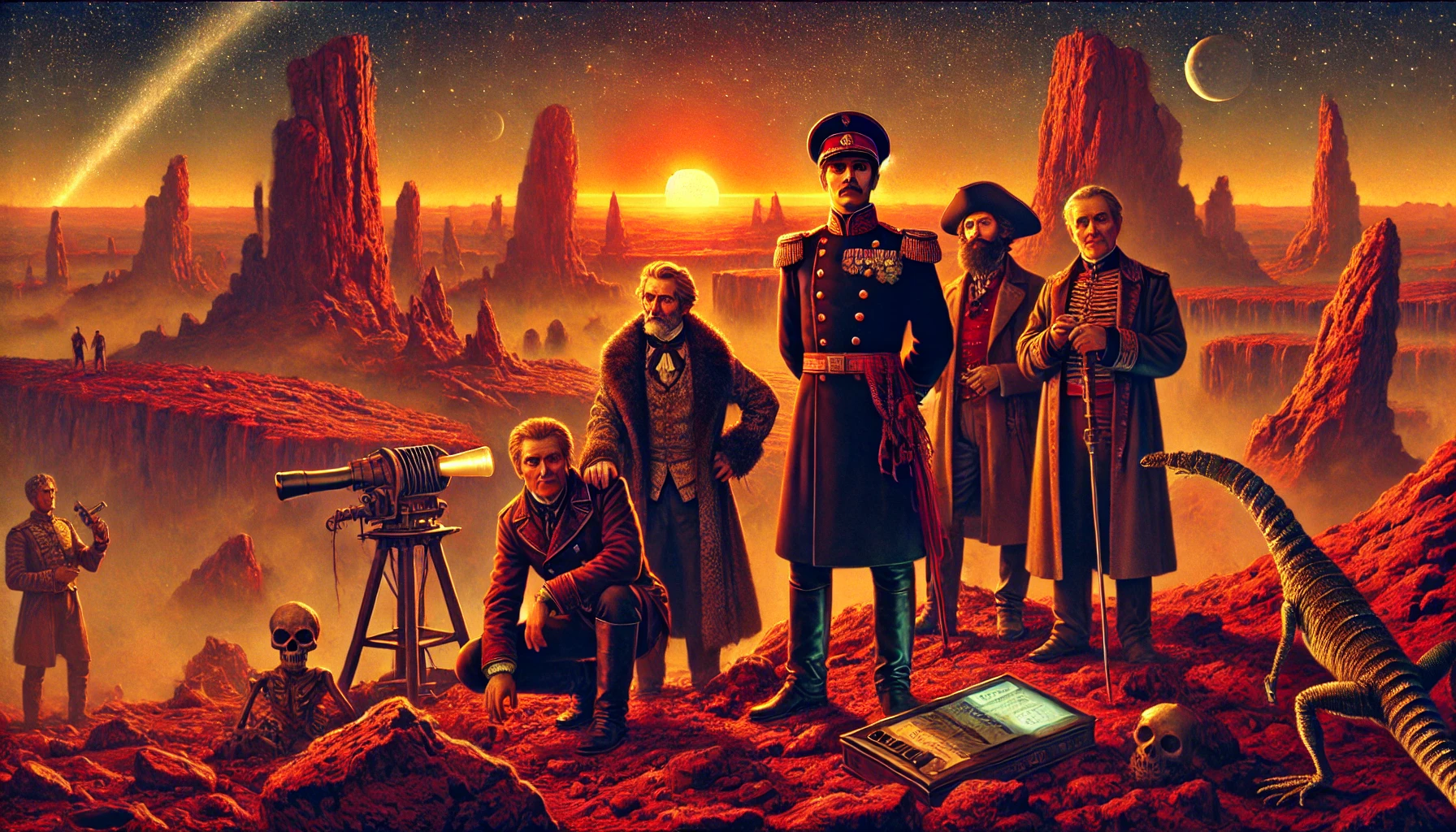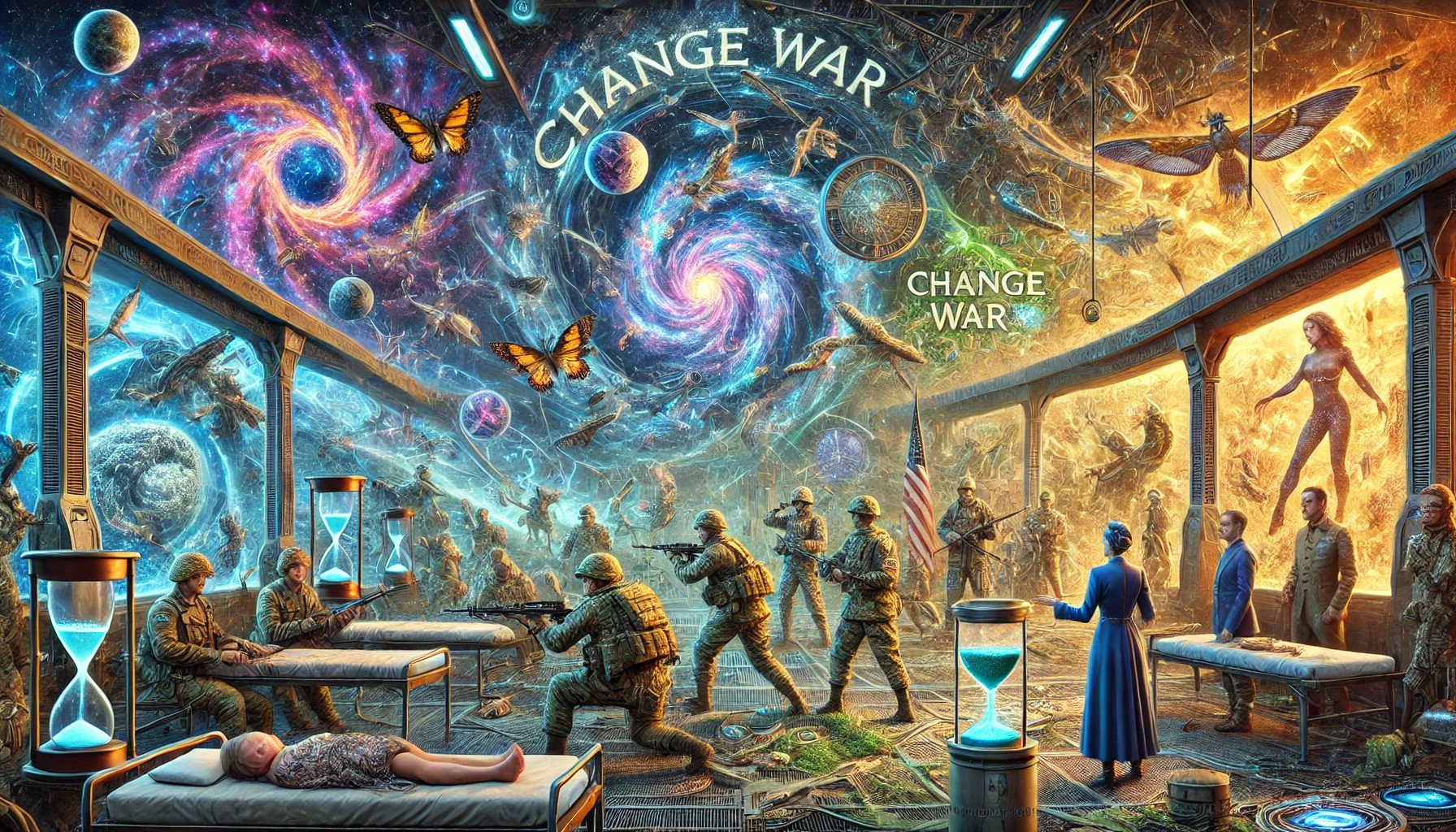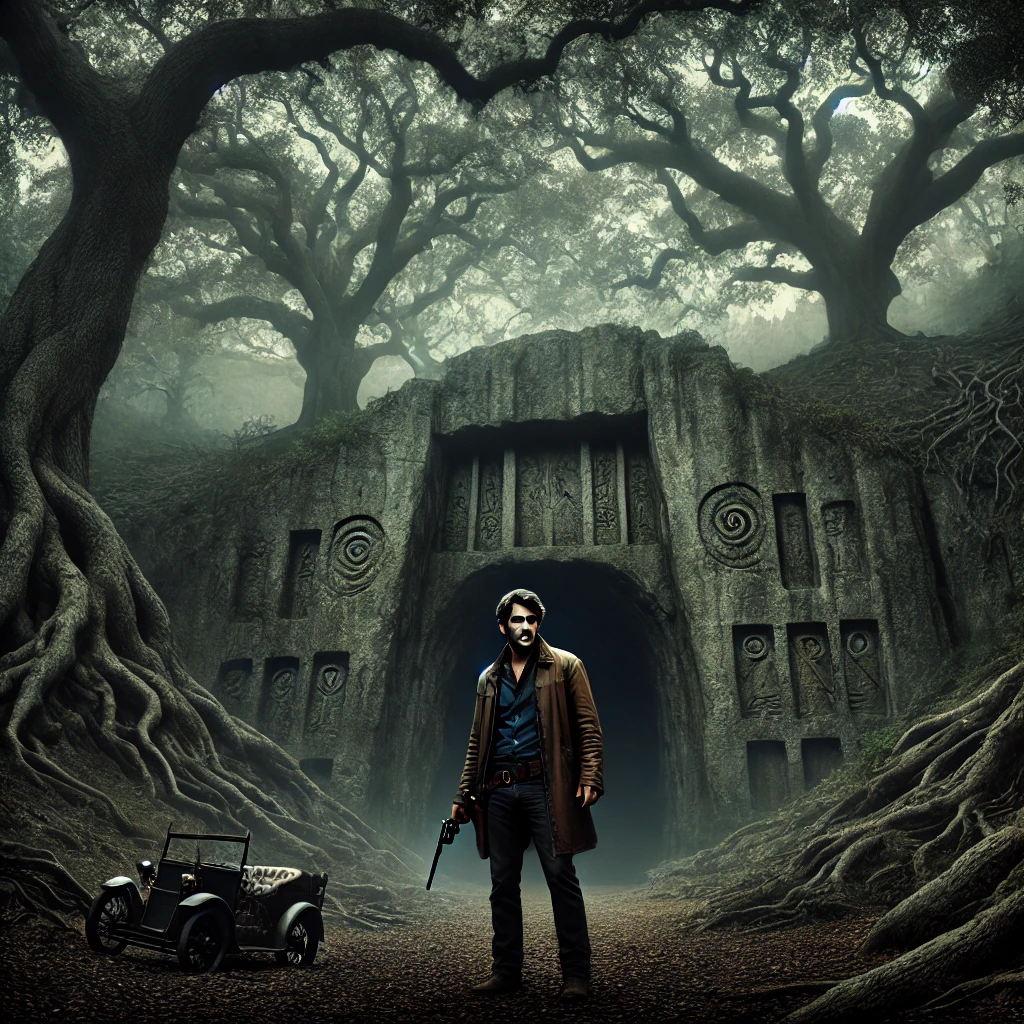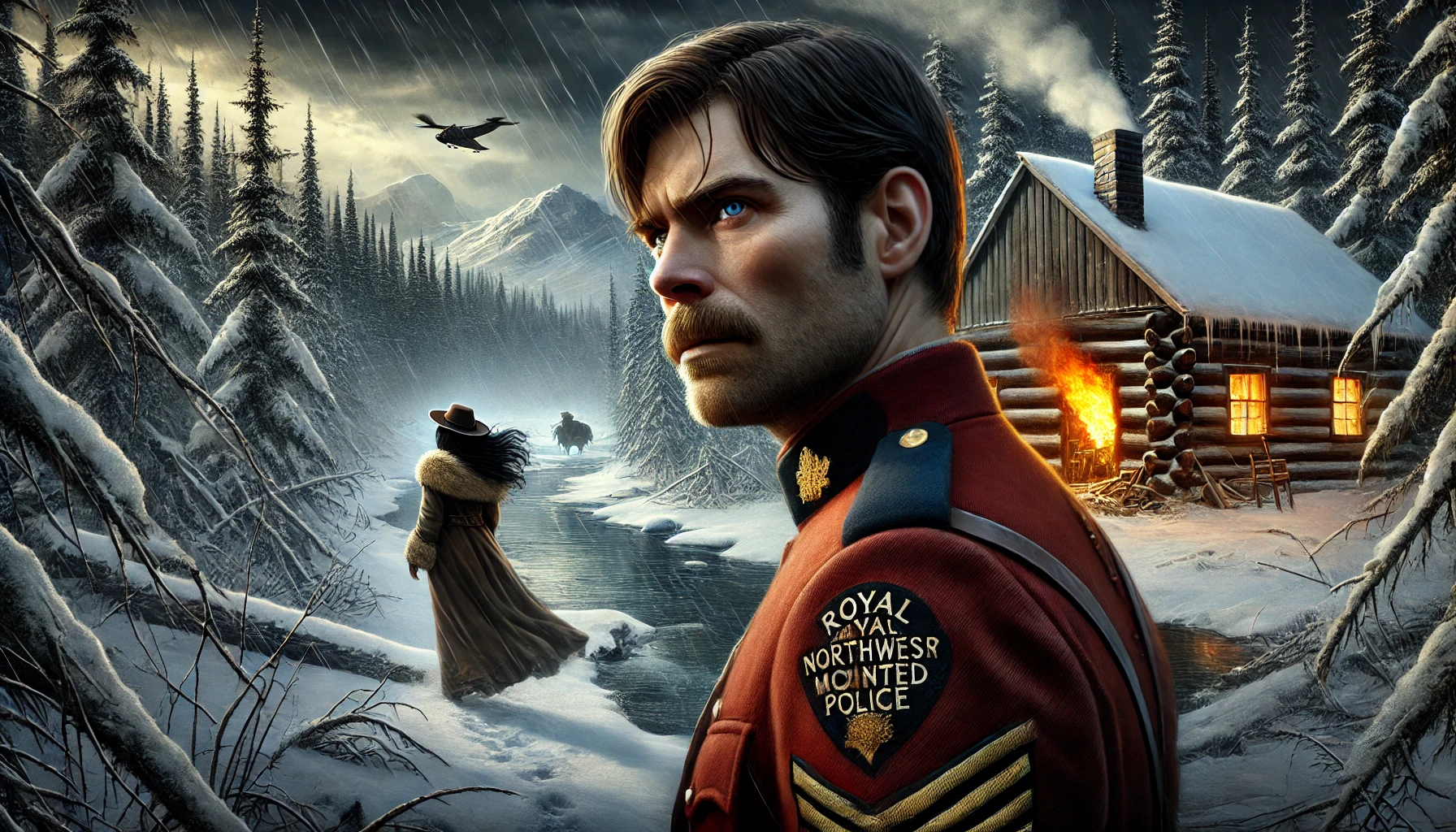Off on a Comet, originally titled Hector Servadac, is a science-fiction novel by Jules Verne, published in 1877. This novel tells a story of an unprecedented adventure where an isolated group of characters is swept off Earth onto a comet after a cataclysmic event. Set against the exotic backdrop of North Africa and the Mediterranean, the novel explores the possibilities of science in space travel and survival under surreal circumstances, with Verne’s characteristic infusion of scientific curiosity and adventurous spirit.
Plot Summary
In the coastal town of Mostaganem in Algeria, on the last day of December, an unusual duel is about to unfold. Captain Hector Servadac, a spirited French officer, and Count Wassili Timascheff, a Russian nobleman, have reached the peak of a rivalry. The Count, anchored off the coast in his schooner, the Dobryna, and Captain Servadac, stationed in a modest outpost on the shore, are to settle a dispute by sword. Their conflict, rooted not only in national pride but also in matters of the heart, is cast aside when a violent, unearthly event shakes their world. A sudden, enormous shockwave strikes, toppling mountains, flooding the seas, and sending the entire globe, it seems, into cosmic disarray.
Captain Servadac awakens buried under the ruins of his shelter, disoriented and unable to comprehend the vast changes around him. Beside him, loyal Ben Zoof, his boisterous and fiercely devoted orderly, stirs and rises as well. Their surroundings appear strange; the coastline has transformed, and the sky holds an odd red hue. Mystified, Servadac looks to his watch, which insists it is morning, but the sun rises from the west rather than the east, leaving both men baffled. Undeterred, the captain and his orderly set out to investigate. On horseback, they discover that the region has somehow become an island, cut off by a newly formed sea that spans as far as they can see. It appears that they, along with a handful of others, are the only people left in this strange new world.
In their explorations, Servadac and Ben Zoof come across Count Timascheff and his crew, who also survived the cosmic event aboard the Dobryna. Though the Count and Servadac’s initial encounter is tense, the urgency of their predicament soon requires cooperation, and the Count’s crew eagerly welcomes the newfound companionship. The differences that had once fueled the rivalry between Servadac and Timascheff now lay forgotten as they unite in the shared goal of survival. Together, the group attempts to make sense of the phenomenon that has swept them away from Earth’s familiar landscapes. They encounter additional survivors, including Palmyrin Rosette, a peculiar but brilliant astronomer, whose reclusive ways and irritable nature complicate the cooperation. Yet, Rosette possesses information that becomes invaluable: through his calculations, he realizes they are now on a comet.
Professor Rosette, brimming with scientific fervor, explains to the others that the comet, which he names Gallia, collided with Earth, tearing off a section of the Mediterranean coast along with its inhabitants. As Gallia hurtles through space, it possesses its own atmosphere, allowing them to survive, albeit under altered conditions. The group learns to adapt to Gallia’s peculiarities: lighter gravity enables feats of great strength and agility, while shorter days and nights and fluctuating temperatures present new challenges. The more they explore Gallia, the more it becomes evident that this alien world is both fascinating and terrifying. Surviving on Gallia requires not only ingenuity and resilience but also cooperation among people who might not ordinarily interact so closely.
During this period of exploration, the comet’s swift course brings it close to Mars, offering the stranded inhabitants a view unlike anything they had seen on Earth. The red planet looms large, its mysteries just as tantalizing as the trials they now face. As they continue to navigate Gallia’s terrain, the survivors grow accustomed to their situation, if not comfortable. Rosette’s calculations reveal that Gallia will eventually complete an orbit and come close to Earth again. Though this brings hope of returning home, it also introduces the sobering possibility that Gallia’s return might result in a second, catastrophic collision. The knowledge hangs over them, and each survivor copes in their own way, contemplating the fragile balance between survival and fate.
As time passes, the group learns to sustain themselves, establishing routines and even finding small joys within their isolated world. Servadac, who becomes a natural leader, works to maintain morale among the group, while Rosette meticulously calculates their movements, refining his predictions. They await Gallia’s approach to Earth with a blend of anticipation and fear, each person haunted by the thought of what the encounter might bring.
Finally, as Gallia nears the Earth, the group’s hopes are rekindled, but the tension rises to a fever pitch. Rosette’s calculations prove correct: Gallia’s path will bring it close enough to offer them a chance to leave but also dangerously close to risking another collision. The comet’s unusual orbit leads them toward the fateful moment when they must act swiftly and decisively. With the return to Earth within sight, the group prepares to launch a desperate escape aboard the Dobryna. Timascheff, with his vessel still intact, agrees to undertake the dangerous voyage, hopeful that they might survive the re-entry into Earth’s atmosphere.
The journey back is filled with both physical and emotional turbulence, as each person struggles with the impact of what they have experienced on Gallia. By the time they approach Earth’s gravitational field, a fierce longing for home has united the group in a bond forged by their time on the comet. The moment finally arrives, and with a blend of fortune and the count’s nautical skill, they survive the descent, landing safely upon Earth’s waters, shaken but miraculously alive.
On Earth, time has passed differently. Though their ordeal felt like a long journey through space, they find that much less time has elapsed. Their world, familiar yet forever changed by their extraordinary journey, welcomes them back, and each survivor carries with them the profound lessons and memories from their time in the strange world of Gallia.
Main Characters
Captain Hector Servadac: A spirited and brave French officer stationed in Algeria. Quick-witted and courageous, he becomes the de facto leader of the group after the catastrophe. His impulsive and inquisitive nature often drives him to investigate and confront the dangers they encounter on the comet.
Ben Zoof: Servadac’s loyal and humorous orderly. Devoted to his master, Ben Zoof’s optimistic outlook and unwavering loyalty provide comic relief and moral support in their strange predicament. His grounded, everyday practicality contrasts sharply with the scientific mysteries around them.
Count Wassili Timascheff: A Russian nobleman and Servadac’s rival. Though initially antagonistic, the shared danger on the comet brings a tentative alliance between him and Servadac. The Count’s calm demeanor and resilience add a composed contrast to the narrative’s intense situations.
Professor Palmyrin Rosette: An eccentric and brilliant astronomer who discovers the nature of the comet. His scientific knowledge is essential to understanding their situation, yet his obsessive, self-centered personality creates tension within the group.
Theme
Isolation and Survival: The characters, cut off from Earth and human civilization, must confront both internal and external challenges for survival. This theme explores the human spirit’s resilience and adaptability in the face of overwhelming odds.
Science and Exploration: Reflecting Verne’s passion for scientific discovery, the novel immerses characters and readers alike in a journey of exploration on a comet. Through Professor Rosette’s astronomical knowledge and Servadac’s curiosity, the story delves into scientific ideas like celestial bodies, gravity, and atmospheres, highlighting mankind’s eternal quest for knowledge.
Human Relationships in Crisis: The novel emphasizes how relationships evolve under pressure. From rivalry to cooperation, Servadac and Timascheff’s interactions underscore themes of unity, teamwork, and reconciliation when survival depends on mutual understanding and shared goals.
Nature’s Power and Human Smallness: The novel’s catastrophic event underscores humanity’s vulnerability in the vast cosmos. By situating a handful of humans on a comet hurtling through space, Verne emphasizes the majestic power of nature and the limited scope of human agency.
Writing Style and Tone
Jules Verne’s writing in Off on a Comet embodies a blend of precise scientific language with vivid descriptions and imaginative detail, making the novel both educational and engaging. Verne’s narrative style is meticulously detailed, creating an immersive experience that lets readers visualize each fantastic scenario with clarity. His dialogues are crafted to reveal the essence of his characters, especially through witty exchanges between Servadac and Ben Zoof, adding humor and lightness to balance the intense adventure.
The tone of the novel shifts between suspenseful and contemplative, as Verne interweaves moments of existential wonder with suspenseful confrontations with the unknown. Despite the scientific rigor, Verne’s writing remains accessible and brisk, making complex scientific ideas and celestial mechanics understandable to readers. Through this blend of science, adventure, and philosophical reflection, Verne invites readers to marvel at the mysteries of the cosmos and ponder humanity’s place within it.
We hope this summary has sparked your interest and would appreciate you following Celsius 233 on social media:
There’s a treasure trove of other fascinating book summaries waiting for you. Check out our collection of stories that inspire, thrill, and provoke thought, just like this one by checking out the Book Shelf or the Library
Remember, while our summaries capture the essence, they can never replace the full experience of reading the book. If this summary intrigued you, consider diving into the complete story – buy the book and immerse yourself in the author’s original work.
If you want to request a book summary, click here.
When Saurabh is not working/watching football/reading books/traveling, you can reach him via Twitter/X, LinkedIn, or Threads
Restart reading!








